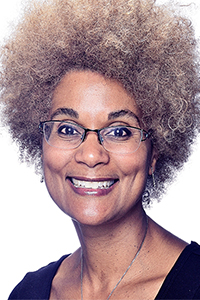A Fearless Endeavour
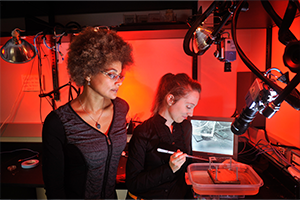
It’s 3 a.m. and Dr. Maydianne Andrade is riding a bike down a sparsely traversed road in the Australian bush. She’s wearing a backpack full of neurotoxin-rich Australian redback spiders—research specimens adorned with a tell-tale orange stripe she’s spent the last five hours collecting. It’s her first year in the field, and she’s testing a theory about how extreme male investment plays out in nature—males can offer themselves as meals to females when mating.
Now, she’s the leading expert on those very spiders and a professor at the University of Toronto Scarborough (UTSC). There, in a lab complete with 100,000 elegant, black-hinged legs stretching across white webs, she greets students who come with reservation (fear of spiders) and eagerness (the thrill of opportunity) to study.
Ironically, entering a lab teeming with spiders bearing enough poison to down a human is not the most courageous thing Dr. Andrade does. She is an activist, sharing data and stories of bias—including her own—to educate others in hopes of creating a more equitable world. “I would love to help people understand through knowledge translation and personal experience that the world isn’t always how it looks.”
She has served as the vice-dean of faculty affairs and equity at UTSC, is president and co-founder of the Canadian Black Scientists Network, and founder and co-chair of the Toronto Initiative for Diversity & Excellence. She has led inclusive conversations about equity and bias for the past decade, including on her podcast, The New Normal.
Dr. Andrade seems to have a well of bravery she draws from when she’s choosing what to spend her time doing—although she doesn’t think of it that way. “In the case of the spiders, I was actually drawn to theory first.”
A scientist, an activist, a courageous storyteller
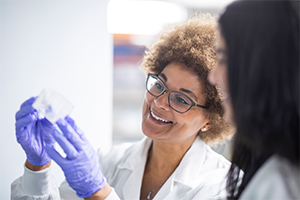
Dr. Andrade didn’t start out as an activist—she’s a scientist, focused on her fundamental research. “That’s all I ever wanted to do. I thought that being a Black woman had nothing to do with my work. I gradually started realizing that some things I was experiencing that I just dealt with weren’t experienced by my white colleagues—certainly not my white male colleagues.” She says she noticed young co-workers facing the same issues and discrimination she’d heard about for years. “I was like, OK, it’s not just going to magically change, because some of these misconceptions are long-standing.”
As a mixed-race, Black-identifying woman, Dr. Andrade may seem like an unlikely candidate to have unconscious bias, but she’s quick to correct that preconceived notion. She believes everyone is biased—even herself.
In 2013, before doing a presentation on unconscious bias, which was a novel topic at the time, she decided to take an implicit association test to check her own. She found she did have an unconscious bias—against Black people.
“I can’t describe what it was like to get that result. I redid the test three times. I spent three solid weeks only reading literature on that test because I wanted to debunk it. I could not come up with a reason why it was harder for me to associate positive things with Blackness than it was for me to associate positive things with whiteness. That was a watershed moment—it shook me to my core.”
Dr. Andrade says she shares this story because she wants people to recognize she’s not calling them racist or sexist, nor does she consider herself those things. She grew up in suburban Vancouver, often one of few Black children in her school. “My associations with Blackness come from the media,” she says, recognizing media portrayal is often biased and unfair. “I am transparent about where I’m coming from.”
Joining together for sustained change
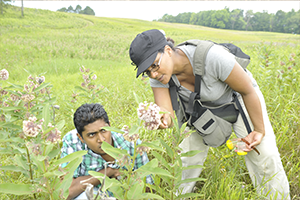
“I think collective action is what’s necessary to affect sustained change on some of these axes of disadvantage.” She explains seeing people work together to create change throughout the COVID-19 pandemic has illuminated that “change is possible when we will it to be.”
“More and more over the last few years, advancement to me is really tied up with equitable treatment of human beings,” Dr. Andrade states, adding that collective action will drive change. She highlights that the pandemic has given us all something to think about: “It has really exposed that people who otherwise are not valued in typical capitalist ways are, in fact, holding things together.”
There is more awareness of the problems in organizational structures, she furthers. “If we have structures in place that make it hard for women or people of colour to enter or stay in organizations, then it’s actually to the detriment of the organizations, and to the detriment of our country.”
Let’s talk at Nexus
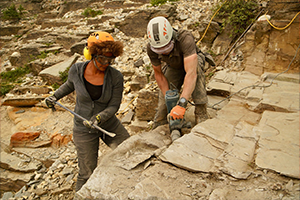
Dr. Andrade takes an inclusive, data-centered approach to conversations about equity and unconscious bias and says the data shows under-representation in every field, and the mechanisms of how bias manifests in a professional context are often misunderstood. “The policies have to have individual actors who are understanding how to live, not just the letter of the law, but the spirit of it.” Once this happens, she explains, most of the people in the room will benefit from equitable treatment.
She pairs statistics with honest, courageous storytelling. “You need to say, this is what it feels like, and these are the ways the individuals sitting next to you in the room are having their aspirations curtailed, their rights and opportunities removed.”
To interrupt bias in oneself, Dr. Andrade suggests not centering yourself in the conversation. “When you talk about equity, it snaps people back into that central position—it can threaten your own identity and feeling that you’re a good person and you go through the world in a particular way.” She suggests reflecting and recognizing you’re looking at overall patterns versus individuals. “Understand that you might be playing a part in what’s going on, even if it’s inadvertent.” She also encourages everyone to lend support to equity initiatives when they come, even if it means losing power or stepping out of a comfortable space to make a difference.
There is no doubt she will continue helping to create the collective action she sees as part of the solution, and she’ll likely do so with the same fearlessness as when searching for Australian redbacks in the darkness. Dr. Andrade is not afraid of poisonous spiders, or difficult conversations.
Photo Credits: Top and third photos, K. Jones; second photo, N. Iwanyshyn; fourth photo, Andy Gregg.

